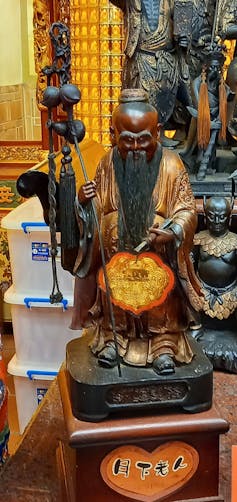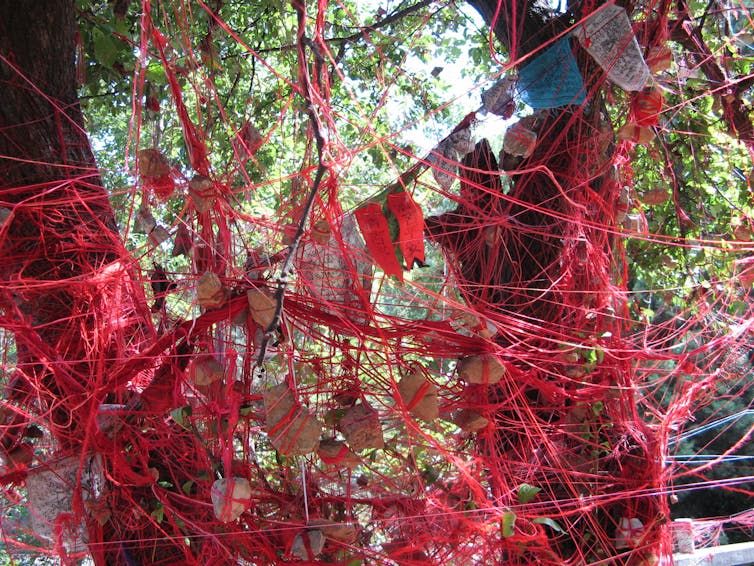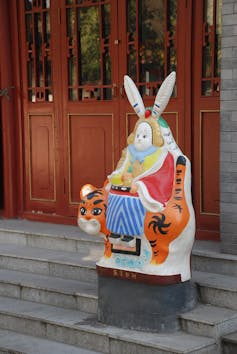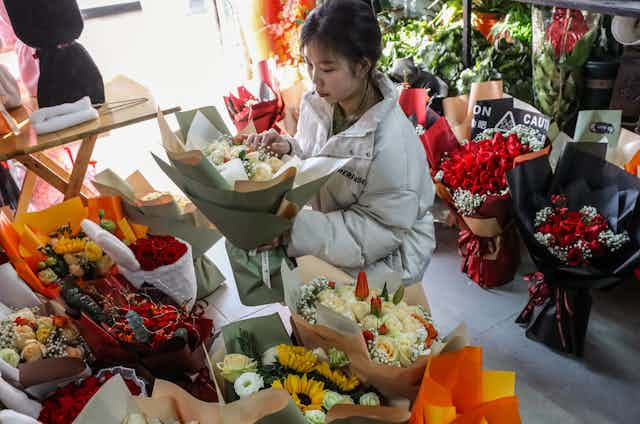In China, people celebrate Valentine’s Day on Feb. 14, but there are at least three holidays and cultural traditions centered on romantic love. A figure that ties together these other holidays is the Old Man Under the Moon – Yuexia Laoren in Mandarin, or Yuelao for short – who is believed to be a divine matchmaker.
In many cultures across the world, including China, parents traditionally arranged their children’s marriages, and love was not necessarily their main concern. In pre-modern China, daughters had little say over their marriage partners. Moreover, they were seen as belonging more to their future husbands’ families than to their birth families. Under these conditions, unmarried girls would pray to the Old Man Under the Moon for a happy marriage.
Girls could either make offerings at home or visit a temple where an image of the Old Man Under the Moon was enshrined. There are other figures in Chinese mythology, such as the “Weaving Maiden” and “Moon Goddess,” who are worshiped for good luck in love. But the Old Man Under the Moon is the most popular god of love and marriage. These days, the name Yuelao has even become a general term for “matchmaker.”
As a scholar of Chinese religious history, I know that understandings of gods can change over time. These days, men and women pray to the Old Man Under the Moon to find their own love match, while the Rabbit God takes care of devotees looking for same-sex romance.
The Old Man Under the Moon
The Old Man Under the Moon was first mentioned in a ninth-century short story called “Engagement Inn,” where he arranged marriages as a divine official.

In the story, an unmarried man named Wei Gu set out before sunrise to meet a matchmaker. He saw an old man reading a document by moonlight and tried to get a peek, but found that he could not decipher the script. The old man laughed and told Wei Gu that he was a divine bureaucrat in charge of human marriages, and his document was a marriage register written in an otherworldly script.
Wei Gu then asked about his own prospects, to which the old man replied that Wei Gu would get married, but it would take 14 years. Wei Gu then asked about a bag the old man was holding. The old man pulled a red cord out of the bag and explained that he used those to tie the feet of a future couple so that fate would bring them together.
In the centuries that followed, the Old Man Under the Moon became an increasingly popular figure in Chinese literature, drama and religion. His statue was enshrined in temples, where unmarried people and their relatives could pray and make offerings in the hope of finding a match.
Like other divine bureaucrats in charge of human affairs, the Old Man Under the Moon is rarely a temple’s central deity, but his icon appears in side halls alongside deities in charge of fertility and education.
Fittingly, he looks like an old man with a long white beard, and he holds the red cords that bind couples to each other. People looking to find a partner often leave red strings tied to tree branches, sometimes with short prayer texts attached to the strings, outside shrines to Old Man Under the Moon.

Heavenly romance
The Old Man Under the Moon can be worshiped year-round, but he has special ties to two holidays in the traditional Chinese calendar: the Double Seventh Festival and the Moon Festival. Valentine’s Day is a new addition to existing Chinese holidays celebrating love and marriage.
In Chinese culture, the most important holiday for romance is the Double Seventh Festival, which appropriately falls on the seventh day of the seventh lunar month. This festival commemorates the story of the star-crossed lovers Weaving Maiden and Cowherd, who live on separate constellations and can meet only once a year.
Unmarried girls make offerings to the Weaving Maiden in hopes of finding a good husband, in addition to saying prayers to Old Man. According to Taiwanese tradition, on the Double Seventh Festival, the Weaving Maiden compiles a list of all unmarried men and women to give to the Old Man Under the Moon. The Old Man then pairs up the single men and women in his marriage registry, binding their feet to seal their shared fate.
The Mid-Autumn Festival, or Moon Festival, on the 15th day of the eighth lunar month focuses on family togetherness, but it also includes romantic themes. Unmarried girls traditionally pray to the Moon Goddess Chang’e and to the divine matchmaker Old Man Under the Moon for a good husband. The Moon Festival is seen as the birthday of the Old Man Under the Moon, so temples sometimes have special events in his honor. The moon represents both wholeness and romance, making it a fitting symbol for the divine matchmaker.
Even the most important holiday on the Chinese calendar, Lunar New Year, can be a time to worship the Old Man Under the Moon. As celebrants set their intentions and goals for the new year, those looking for love and marriage will make a point of sending prayers to the Old Man Under the Moon.
The Rabbit God
Apart from the Old Man Under the Moon, another divine matchmaker in Chinese mythology is the Rabbit God, who has been worshiped as far back as the 18th century as a god of love between men.

Members of the LGBTQ+ community in Taiwan revived the worship of this deity as a same-sex counterpart to the Old Man Under the Moon. The Rabbit God binds same-sex couples, just as the Old Man Under the Moon binds couples of the opposite sex.
Same-sex couples in Taiwan can visit Wei Ming Tang temple, which is dedicated to the Rabbit God, to seek lasting romantic love and marriage. Worship of the Rabbit God can be done more openly in Taiwan, which is the only place in Asia where same-sex marriage is legal. LGBTQ+ relationships are frowned upon in mainland China.
The Old Man Under the Moon has long sustained the hope for romance and love in arranged marriages. Now that most people in Chinese culture find their own marriage partners, he offers hope that people will be able to find their match in a sea of possibilities. The Rabbit God offers the same hope for the LGBTQ+ community, especially in Taiwan.

